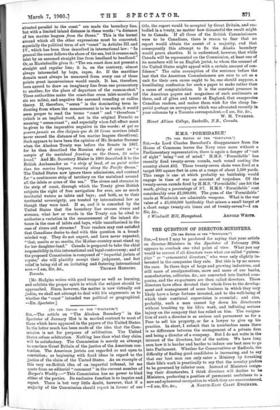THE QUESTION OF DIRECTOR-MINISTERS.
[To THE EDITOR OF TER "SPECTATOR:1
Sin,—I trust I may be pardoned for saying that your article on director-Ministers in the Spectator of February 28th appears to overlook one vital point of view. What you say would be correct if all directors were what are called " guinea- pigs " or "ornamental directors," who were only slightly in- terested in the companies they rule. But this is by no means the case. In these days of large and growing industries, and still more of amalgamations, more and more of our banks, manufactories, collieries, &c., are converted into limited com- panies, and the ex-partners are then called directors. These directors have often devoted their whole lives to the develop- ment and management of some business in which they very likely have a large fortune invested, and to the well-being of which their continual supervision is essential; and also, probably, such a man cannot lay down his directorate without breaking up his life's work, and inflicting serious injury on the company that has relied on him. The resigna- tion of such a director is as serious and permanent as for a Peer to sell his property, or for a lawyer to give up his practice. In short, I submit that in numberless cases there is no difference between the management of a private firm and being a director of a company. But I do not write in the interest of the directors, but of the nation. We have long seen how it is harder and harder to induce our best men to go into Parliament. Whether for Conservatives or Radicals, the difficulty of finding good candidates is increasing, and to say that our best men can only enter a Ministry by forsaking their life's work is practically to say that the country prefers to be governed by inferior men. Instead of Ministers resign- • ing their directorates, I think directors will decline to be Ministers, preferring a position of permanent usefulness to a new and ephemeral occupation to which they are unaccustomed.










































 Previous page
Previous page